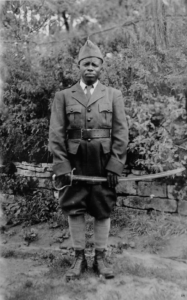Una mattina mi son alzato,
o bella ciao, bella ciao, bella ciao ciao ciao!
Una mattina mi son alzato
e ho trovato l’invasor.
O partigiano portami via,
o bella ciao, bella ciao, bella ciao ciao ciao
o partigiano portami via
che mi sento di morir.

E se io muoio da partigiano,
o bella ciao, bella ciao, bella ciao ciao ciao,
e se io muoio da partigiano
tu mi devi seppellir.
Seppellire lassù in montagna,
o bella ciao, bella ciao, bella ciao ciao ciao,
seppellire lassù in montagna
sotto l’ombra di un bel fior.

E le genti che passeranno,
o bella ciao, bella ciao, bella ciao ciao ciao,
e le genti che passeranno
mi diranno «che bel fior.»

Questo è il fiore del partigiano,
o bella ciao, bella ciao, bella ciao ciao ciao,
questo è il fiore del partigiano
morto per la libertà
![Giorgio Marincola "Mercury": Weary of political discourse, Marincola veered into armed resistance, putting his medical studies on hold to assist in raids against German military forces in the vicinities of Rome and Viterbo. onfined at the Bolzano concentration camp. His enemy captors put him on live radio hoping he would recite a propaganda script critical of the resistance movement. He audaciously did just the opposite, saying: “Homeland means freedom and justice for the peoples of the world. This is why I fight the [German] oppressors.”](http://andre.mabande.se/texter/wp-content/uploads/2023/04/image-2.png)
Comments are disabled for this post